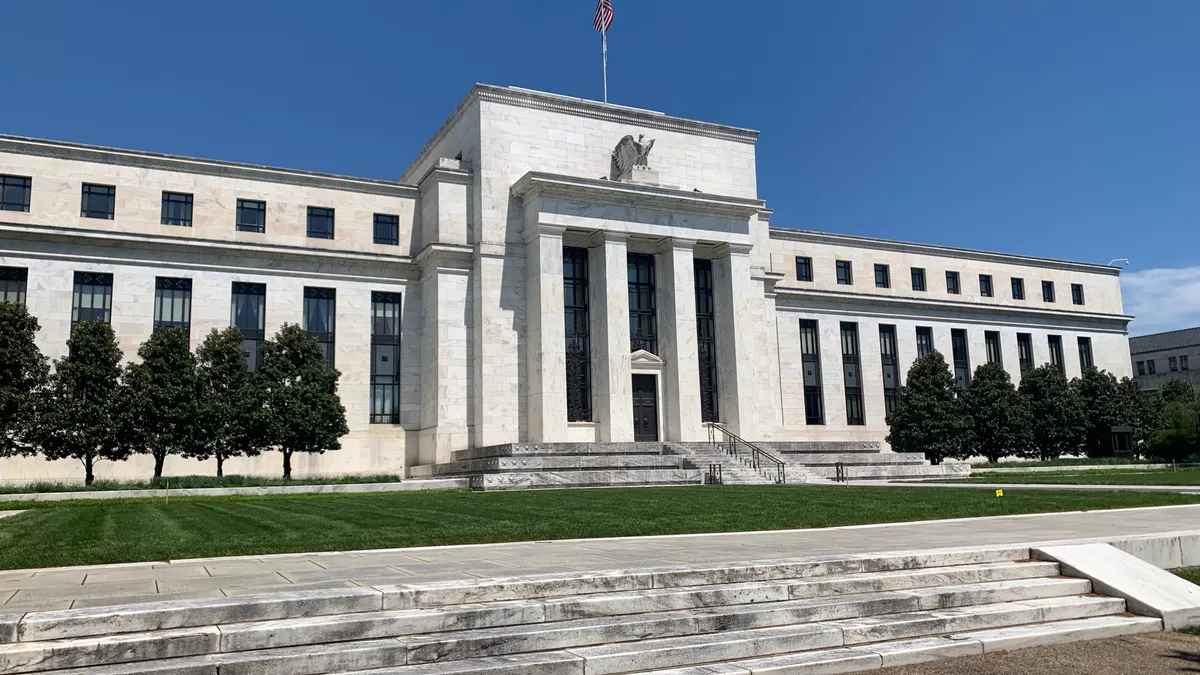Dive Brief:
- The Federal Reserve Board on Tuesday said it has joined the Network for Greening the Financial System (NGFS), a group of central banks and supervisors committed to managing climate change's financial risks and mobilizing mainstream finance toward a sustainable economy.
- The move signals a burgeoning recommitment by the U.S. to the Paris Climate Accord, a requirement of full membership in the NGFS. President Donald Trump announced in 2017 he was withdrawing the country from the Paris agreement. President-elect Joe Biden has said the U.S. will rejoin after he takes office next month.
- Fed membership in the NGFS and other international climate-focused organizations was among the 53 actions a Commodity Futures Trading Commission (CFTC) subcommittee suggested in a September report on managing climate-related risk. The Fed wouldn't be the only U.S.-based regulator attached to the NGFS. New York's Department of Financial Services is also among the group's 83 members.
Dive Insight:
The Fed's membership in the NGFS, formalized last week by a 5-0 vote, comes more than a year after the central bank began participating in discussions with the group. The Fed's vice chair for supervision, Randal Quarles, told The Wall Street Journal last month the central bank had requested membership.
“Climate change is an emerging risk to financial institutions, the financial system and the economy, and we are, as so many others are, in the very early stages of understanding what that means, what needs to be done about it and by whom,” Fed Chairman Jerome Powell said Wednesday, after a meeting of the Federal Open Market Committee, according to American Banker.
Lawmakers and former regulators applauded the move with tempered language.
"This is important but incremental progress," Sen. Brian Schatz, D-HI, said in a statement. Schatz sponsored a bill last year that would force the Fed to conduct stress tests every two years to measure large banks' ability to weather financial risks brought on by climate change.
"I will expect [Fed officials] to take further concrete steps towards managing climate risks," Schatz said Tuesday, according to The Wall Street Journal.
Sarah Bloom Raskin, a former Fed governor, said NGFS membership "is somewhere between putting their toe in the water and doing a full plunge."
"Joining the ongoing discussions will assist the Fed in learning how other regulators are thinking about the connections among climate, the economy and financial stability," she said, according to the Journal.
The central bank's commitment follows a track of gradual warming toward change but relatively slow adaptation. For example, the Fed said in August it was partnering with researchers at the Massachusetts Institute of Technology to build and test a "hypothetical" central bank digital currency. But two months later, Powell urged caution, saying he'd rather "get it right" than "be first." By all accounts, the U.S. would lag several other countries in developing the technology — notably, Sweden, Canada and China.
Although the Fed is one of eight new NGFS members this month, 75 central banks and supervisors had joined earlier. Membership gives the Fed a voice on pending ideas and actions against climate change.
Fed officials have said repeatedly overall environmental policy must be set by elected officials. No Fed officials have said climate issues are a direct influence on their monetary policy decisions, but the leaders of Fed banks in Dallas and Atlanta — districts that have seen major storms such as 2017's Hurricane Harvey — have said climate issues influence how they think the economy will perform.
Meanwhile, the Fed lags other regulators. NYDFS in October called on the financial institutions it oversees to integrate climate change-related financial risks into their business strategies, risk management processes and governance frameworks but stopped short of explicitly pushing climate-related stress tests. The CFTC subcommittee a month earlier said forcing businesses to pay for their greenhouse gas emissions would be the most efficient way to ensure financial markets reduced climate risk.
And banks themselves have joined international efforts to standardize the way banks measure and reduce their climate impact. Morgan Stanley, Citi and Bank of America in July joined the Partnership for Carbon Accounting Financials. Additionally, Citi last year became the first major U.S. bank to endorse the United Nations' Principles for Responsible Banking.













